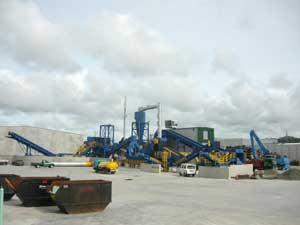| WHEN CMA Recycling’s new scrap metal shredder in Onehunga becomes fully operational on March 9, the playing field for New Zealand’s scrap metal and recycling will be levelled – and CMA’s engineering and manufacturing customers will experience unprecedented levels of service. It also means that overseas buyers will have access to a much higher grade of product – which is essential in the current volatile global market that has seen metal prices falling from all time highs to all time lows in a matter of months, and prices fluctuating daily. “Scrap metal is an internationally traded commodity for steelmaking but different kinds of scrap require different processing because of size, thickness, composition of the material and end use,” explains CMA Recycling sales manager Shane Temata. “Shredding, bailing and shearing are three principle scrap processes and this latest equipment obtained by CMA offers improved performance, greater automation, as well as reduced energy and operating costs. “Modern scrap recycling operations must be capable of handling a wide range of scrap grades economically as well as meeting the size, density and purity requirements demanded by overseas markets,” he adds. |
“This new facility surpasses these requirements, plus it demonstrates the faith CMA has in the market and our commitment to our customers.” Temata says the proportion of steel smelted from scrap around the world has risen to more than 50 percent and is still rising – thus creating a growing demand for high quality processed scrap. Fully consented by the Auckland Regional Council and ACC, the new Onehunga facility is an industry leader he says. “The automated processing equipment combined with previously unheard of customer and staff facilities, further enhances our reputation as the most efficient operator in the industry.” CMA Recycling is a relatively new name in the local metal recovery industry but has already grown to be the second largest metal recycler in New Zealand. Since purchasing Scrap Metal Recyclers (New Zealand’s largest privately owned scrap metal company) CMA has bought several other scrap metal businesses, and acquired the transport assets of two specialised local haulage contractors. In quick succession it purchased Steel Can Recyclers, Cableco and Bay Scrap Metals. As a result, CMA Recycling now has its own modern fleet of distinctive green trucks – 32 in total. So it does not rely on outside operators for collecting scrap metal, and Temata says there are no separate charges for transport. CMA has streamlined the recycling process, he says, with faster turnarounds and less hassles. “Simply phone when you’re ready for a collection and one of our trucks will call round. Payment is arranged the next day – in the form of cash, direct credit or cheque. Our services also include secure destruction and full product stewardship.” The new facility takes product 24 hours a day says Temata, which means no waiting, and deliveries are processed straight-away. With the current tough economic climate, he’s predicting that more engineering and manufacturing companies especially will now look more closely at their recycling needs. “Many manufacturers still don’t realise the true value of their scrap. For example, swarf, which is worth around $80 a tonne, is still being thrown away.” Asked why CMA has become so successful so quickly Temata replies: “The courage to make difficult decisions where required, visionary management philosophy combined with the expertise of our employees – many of whom have been in the scrap metal business for decades. This brings a level of professionalism unmatched in the industry. “We put that expertise to use every day by providing flexible service and pricing opportunities to our customers. These customers consider us business partners because of our reputation for integrity, honesty, value and quality service. They maintain or extend their business relationship with CMA because they have faith in what we bring to their business.”• Enquiries: shane.temata@cmacorp.net
|






